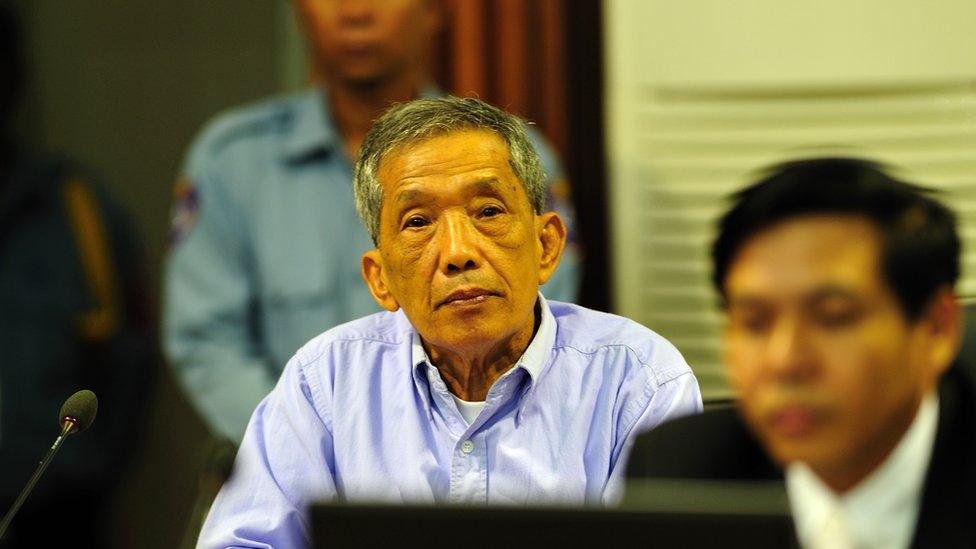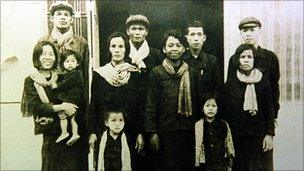Duch: Symbol of Khmer Rouge horror
- Published

Duch in the courtroom in July 2010
In early 1999, in a village in northwest Cambodia, an elderly man introduced himself to a journalist.
He was Hong Pen, he said, a former teacher from the capital, Phnom Penh. He spoke good English and was wearing the T-shirt of an American aid organisation.
But the journalist recognised his face - it matched a photograph he had carried with him for several months.
The picture was of Comrade Duch, the former head of Tuol Sleng prison.
There, during the four years of Khmer Rouge rule, as many as 17,000 men, women and children were interrogated and tortured. Then they were killed, their bodies tossed into mass graves.
The chance meeting with the journalist led to Duch's detention.
He was to become the first of the surviving Khmer Rouge leaders to be tried at Cambodia's UN-backed genocide court.
There he argued that he was obeying orders from above and that he would have been killed if he had defied his superiors.
But that earned him little forgiveness in a country where what happened at Tuol Sleng has become the most powerful and prominent symbol of the atrocities that took place under the Khmer Rouge regime.
School teacher
Duch was born Kaing Guek Eav in the central province of Kampong Thom in the early 1940s.
He excelled at mathematics and so won places at top schools.
After graduation he studied for his teaching certificate in Phnom Penh. It was there that he met students from China and became drawn to communist ideology.
Later he became a high school teacher, earning a reputation as a tough and exacting instructor. But his leftist activism had attracted the attention of the police and in the late 1960s he was detained for several months.
By then conflict was spreading through the country. US and south Vietnamese forces had invaded Cambodia in search of communists from north Vietnam. They bombed swathes of eastern Cambodia, driving villagers into the arms of leftist rebels fighting the unpopular US-backed government.
Duch joined the rebels, who were calling themselves the Khmer Rouge. He served as a sector security chief and, in 1971, spent three months interrogating captured French anthropologist Francois Bizot.
Mr Bizot described him as a "truth seeker", someone "looking for the absolutes in life". He later learned that his release came about because Duch was convinced of his innocence and had appealed on his behalf.
It was a rare act of mercy from Duch, who was soon to be promoted.
Killing fields
On 17 April 1975, after years of fighting, Khmer Rouge guerrillas took Phnom Penh. It was the start of nearly four years of horror for Cambodia.
Currency was abolished and city dwellers sent to work in the fields, where hundreds of thousands starved to death. Enemies of the regime - a designation that was interpreted broadly - were eliminated with chilling efficiency.

Duch, seen here in 1977, told the UN court he hated his work at the prison
Tuol Sleng, of which Duch became the director, was a key part of that killing machine. The regime's most prominent jail, also known as S-21, was housed in a former secondary school in the centre of the city.
Thousands of people - officials from the old government, those accused of being middle class and latterly mainly Khmer Rouge members suspected of disloyalty - were brought to the prison.
Their presence in Tuol Sleng meant that they had already been condemned. Once inside, they were weighed and photographed. Then the questioning began.
Prisoners were told to write detailed confessions setting out their disloyalty. They were told to admit they were spies and implicate friends and family. Refusing to confess was not an option, and those that tried were brutally tortured. Many were tortured anyway.
Top-ranking prisoners were kept alive for months to ensure that their confessions - in some cases methodically checked and annotated by Duch - were complete. Less important inmates were processed in a shorter time. Either way, the final journey was the same.
Prisoners were taken to the "killing fields" at Choeung Ek, a few kilometres outside Phnom Penh. There they were killed, sometimes after digging their own graves.
Children of the condemned were not spared. Today a sign stands next to a tree at Choeung Ek. It reads: "Killing tree against which executioners beat children".
Less than a dozen prisoners are known to have survived incarceration at Tuol Sleng. When a Vietnamese invasion forced the Khmer Rouge from power in January 1979, a photographer found inmates' corpses rotting in the otherwise deserted building.
'Couldn't help'
The Khmer Rouge retreated to strongholds in the northwest, and Duch went with them.
He spent years living on the border with Thailand. He learned to speak English and at several points worked for aid organisations. He also returned to teaching and, in the mid-1990s, converted to Christianity.
When photojournalist Nic Dunlop identified him in April 1999, he had settled with his children near Battambang.
In a subsequent interview with Mr Dunlop and another journalist, Nate Thayer, he talked of his role at Tuol Sleng. He had done very bad things, he said, but the orders came from the Khmer Rouge's central committee.
"Whoever was arrested must die. It was the rule of our party," he said. "S21 had no right to arrest anybody. We had the responsibility to interrogate and give the confession to the central committee of the party."
Ten years later, in court, he described himself as "deeply remorseful" and apologised to relatives of his victims.
He said that he had "hated" his work at the prison, but had been motivated by fear, both for himself and for his family.
"I could do nothing to help," he said. "Pol Pot regarded these people as thorns in his eyes."
In the closing days of his trial, he asked to be freed, saying he had not been a senior member of the Khmer Rouge hierarchy. That, said relatives of his victims, made a mockery of his claims of remorse.
In July 2010 he was convicted of crimes against humanity by the genocide court and jailed for 35 years. Appeal court judges later extended his sentence to life.
When the life term was announced, reports from the court said, the elderly jailer showed no emotion.
A few years later Duch was a key witness in another high-profile trial - testifying against Nuon Chea, Pol Pot's deputy who died last year, and Khieu Samphan, the regime's head of state.
They were also given life terms, and the three men remain the only three former Khmer Rouge ever sentenced.